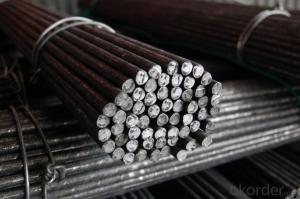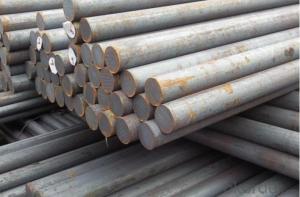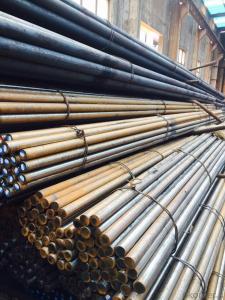Grade AISI1045 CNBM Carbon Steel Round Bar
- Loading Port:
- Shanghai
- Payment Terms:
- TT OR LC
- Min Order Qty:
- 20 m.t.
- Supply Capability:
- 10000 m.t./month
OKorder Service Pledge
OKorder Financial Service
You Might Also Like
Item specifice
Specifications:
Material | 1045 | Round bar | Dia(mm) | 16-300 |
Process | EAF + LF + VD + Forged + Heat Treatment (optional) | Length (mm) | Max 12000 | |
Heat treatment | Normalized / Annealed / Quenched / tempered | Flat bar | Thickness(mm) | 8-500 |
Delivery condition | Hot forged +Rough machined (black surface after Q/T)+ Turned (optional) | Width(mm) | 70-200 | |
Test | Ultrasonic test according to SEP 1921-84 D/d | Length (mm) | Max 12000 | |
Chemical Composition:
C | Si | Mn | S | P | Cr | Ni | Mo |
0.42~0.50 | ≤0.40 | 0.50~0.80 | ≤0.045 | ≤0.045 | ≤0.40 | ≤0.40 | ≤0.10 |
Usage and Applications:
Mold bottom
Plastic mold
Construction machinery parts
Automobile parts
Security grills
Screens
Construction
Packaging & Delivery:
Packaging Detail: Standard seaworthy packing or as customer required; all goods are packed in bundle with steel strips and shipped by break bulk vessel or container
Delivery Detail: 45 days
Production Flow:
EAF+LF+VD+ Forged+ Heat Treatment
Material prepare (billet) — heat up — rough rolling — precision rolling — cooling — packing — storage and transportation
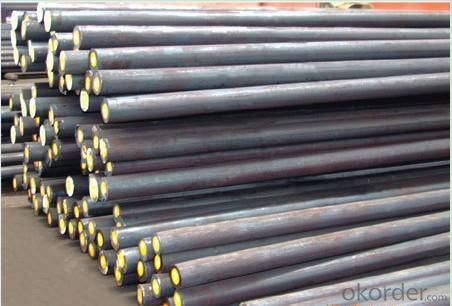
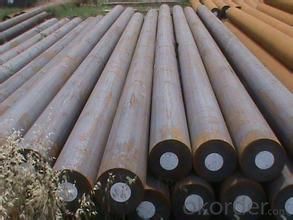
Quality Assurance:
1. We will strictly inspect our production that we sold according to the customer’s request.
2. Our steel reaches international quality standards.
3. Quality should be in conformity with the specification of the manufacturer. Quantity and packing conditions should be in conformity with the term in the contract.
4. Should the packing found damaged, the buyer has the right to claim to the seller
- Q:How does special steel contribute to the aerospace landing gear industry?
- The aerospace landing gear industry relies heavily on special steel to ensure safe and efficient aircraft landings. Special steel is essential for providing the required strength, durability, and resistance to extreme conditions. One vital aspect of landing gears is their high tensile strength, as they bear the weight of the aircraft during takeoff, landing, and taxiing. Special steel alloys, such as ultra-high strength steels, are specifically engineered to resist deformation and endure the immense forces exerted on the landing gear. These steels possess remarkable mechanical properties, enabling them to maintain their structural integrity under heavy loads. Additionally, special steel used in aerospace landing gears must exhibit exceptional fatigue resistance to withstand the repeated stress cycles experienced during each landing. Fatigue failure of landing gears can have catastrophic consequences, so the use of high-quality steel ensures an extended service life and reduces the risk of failure. Moreover, special steel alloys used in landing gears must possess outstanding corrosion resistance. Aircraft operate in diverse environments, including humid and salty conditions, which can accelerate corrosion. By utilizing corrosion-resistant steels, the landing gear components can endure these harsh conditions and maintain their performance and safety over time. Furthermore, the unique properties of special steel alloys allow for weight reduction in landing gear components. The aerospace industry constantly strives to decrease aircraft weight to enhance fuel efficiency and performance. Special steel alloys, such as high-strength low-alloy (HSLA) steels, provide the perfect balance between strength and weight, enabling the design of lighter landing gear components without compromising safety or durability. In conclusion, special steel is indispensable to the aerospace landing gear industry due to its ability to provide the necessary strength, fatigue resistance, corrosion resistance, and weight reduction capabilities required for safe and efficient aircraft landings. By utilizing special steel alloys, the industry can ensure the reliability and longevity of landing gear components, thereby contributing to the overall safety and performance of aircraft.
- Q:How does special steel contribute to the impact resistance of products?
- Special steel, which is also referred to as high-strength or high-performance steel, plays a critical role in enhancing the impact resistance of various products. This particular type of steel is designed specifically to possess exceptional strength, toughness, and durability, making it highly resistant to deformation and fracture under conditions of high stress. One of the main contributing factors to the impact resistance of special steel is its composition. Special steel often contains alloying elements such as manganese, chromium, nickel, molybdenum, and vanadium, which are added to improve its mechanical properties. These alloying elements provide the steel with increased hardness, tensile strength, and resistance to wear, corrosion, and fatigue. Consequently, products made from special steel can withstand heavy impact loads without deforming or breaking. Furthermore, the microstructure of special steel plays a crucial role in its impact resistance. Advanced manufacturing techniques can be employed to finely adjust the steel's microstructure, achieving a desirable combination of strength and toughness. Special heat treatment processes, like quenching and tempering, can further refine the microstructure, resulting in a material that can effectively absorb and dissipate energy. This renders special steel highly resistant to cracks and fractures, even when subjected to sudden and severe impacts. In addition to its inherent properties, special steel is often utilized in the form of engineered components or structures that are specifically designed for impact resistance. For instance, in the automotive industry, special steel is employed in manufacturing components such as crash beams, bumpers, and roll cages. These components are designed to absorb and distribute impact energy, safeguarding the vehicle and its occupants during accidents. Overall, special steel significantly contributes to the impact resistance of products by providing superior strength, toughness, and durability. Its distinctive composition, microstructure, and design enable it to withstand high-stress conditions and effectively absorb impact energy. Consequently, products made from special steel offer enhanced safety and reliability, making them suitable for a wide range of applications in industries such as automotive, aerospace, construction, and defense.
- Q:Can special steel be used in the telecommunications industry?
- Yes, special steel can be used in the telecommunications industry. Special steel, such as stainless steel or corrosion-resistant steel, can be utilized for various applications in telecommunications infrastructure, including tower structures, antenna components, cables, and connectors. These types of steel offer high strength, durability, and corrosion resistance, ensuring reliable and long-lasting performance in the telecommunications sector.
- Q:How does special steel compare to other materials, such as aluminum or titanium?
- Special steel is known for its exceptional strength, durability, and resistance to wear and tear, making it superior to materials like aluminum or titanium in various applications. While aluminum is lightweight, it lacks the same level of strength and toughness as special steel. Titanium, on the other hand, offers comparable strength but is significantly more expensive. Special steel strikes a balance between strength, cost-effectiveness, and versatility, making it a preferred choice in many industries.
- Q:What are the different methods for shot peening special steel?
- Shot peening is a widely used method for improving the fatigue strength and performance of special steels. There are several different methods for shot peening special steel, each with its own advantages and considerations. 1. Air Shot Peening: This is the most common and traditional method of shot peening. It involves propelling small steel shots at high speeds using compressed air. Air shot peening is effective for treating large surfaces and achieving uniform coverage. It is suitable for most special steels, but may not be suitable for certain delicate or highly sensitive materials. 2. Wheel Shot Peening: In this method, steel shots are propelled using a rotating wheel. Wheel shot peening is particularly effective for treating small or intricate parts, as it offers better control and accuracy. It is commonly used for shot peening gears, shafts, and other components with complex geometries. 3. Wet Shot Peening: This method involves shot peening in a wet environment, usually using a mixture of water and shot media. Wet shot peening offers increased control over shot flow and reduces dust formation. It is often preferred for shot peening special steels that are highly sensitive to heat or have a risk of distortion. 4. Ultrasonic Shot Peening: This advanced method utilizes high-frequency vibrations to propel the shot media onto the steel surface. Ultrasonic shot peening offers enhanced control over shot velocity and impact energy, resulting in improved surface finish and fatigue life. It is particularly useful for shot peening thin or delicate special steels. 5. Laser Shot Peening: This method employs laser pulses to generate shockwaves on the steel surface, causing compressive residual stresses. Laser shot peening is highly precise and can be controlled to treat specific areas or patterns. It is often used for shot peening special steels that require localized treatment or have complex geometries. It is important to note that the selection of the shot peening method depends on various factors, including the type of special steel, component geometry, required surface finish, and desired residual stress profile. Therefore, it is essential to consult with shot peening experts or engineers to determine the most suitable method for shot peening special steel.
- Q:How does special steel contribute to the formability of products?
- Special steel contributes to the formability of products by providing enhanced mechanical properties, such as higher strength, toughness, and ductility. These properties allow the steel to be shaped and formed into complex geometries without cracking or deforming. Additionally, special steel alloys may have improved resistance to corrosion, wear, and heat, enabling the production of durable and long-lasting products.
- Q:How does special steel contribute to the defense equipment industry?
- Special steel plays a crucial role in the defense equipment industry by offering superior strength, durability, and performance characteristics that are essential for producing high-quality military equipment. This type of steel is specifically engineered to meet the demanding requirements of defense applications, ensuring the safety and effectiveness of military personnel and operations. One of the key contributions of special steel to the defense equipment industry is its ability to withstand extreme conditions and environments. Military equipment often operates in harsh conditions, including extreme temperatures, high pressures, corrosive environments, and impact forces. Special steel is designed to maintain its structural integrity and performance under these challenging conditions, providing a reliable and long-lasting solution for defense equipment. Moreover, special steel offers exceptional strength and toughness, making it ideal for manufacturing armored vehicles, tanks, and military aircraft. It provides a high level of protection against ballistic threats and can withstand projectile impacts and explosions. The use of special steel in defense equipment ensures the safety of military personnel and enhances their survivability in combat situations. Additionally, special steel is essential for the production of cutting-edge weaponry and munitions. It is used in the manufacturing of firearms, missiles, and artillery systems due to its excellent mechanical properties and ability to withstand high pressures. Special steel also enables precision engineering, ensuring the accuracy and reliability of military firearms and projectiles. Furthermore, special steel contributes to the defense equipment industry by supporting technological advancements. As technology continues to evolve, the defense sector requires materials that can meet the demands of modern warfare. Special steel can be tailored and optimized to meet specific performance requirements, allowing for the development of advanced defense systems such as stealth technology, electronic warfare, and precision-guided munitions. In conclusion, special steel plays a pivotal role in the defense equipment industry by providing the necessary strength, durability, and performance characteristics required for military applications. It ensures the safety and effectiveness of defense personnel and equipment, withstands extreme conditions, enables the production of advanced weaponry, and supports technological advancements in the defense sector.
- Q:How does special steel perform in extreme weather conditions?
- Special steel is specifically designed to perform well in extreme weather conditions. It has high resistance to corrosion, making it suitable for use in harsh environments, such as extreme cold or hot temperatures, high humidity, or exposure to saltwater. Special steel also has excellent strength and toughness, enabling it to withstand heavy loads, impact, and vibrations. Overall, special steel exhibits superior performance and durability in extreme weather conditions, making it an ideal choice for various applications, including construction, marine, and aerospace industries.
- Q:How does special steel resist oxidation at high temperatures?
- Special steel resists oxidation at high temperatures due to the presence of alloying elements such as chromium, aluminum, and silicon. These elements form a protective layer of oxides on the surface of the steel, which acts as a barrier against further oxidation. This layer is stable even at high temperatures, preventing the steel from reacting with oxygen in the environment and thus maintaining its structural integrity.
- Q:How is stainless steel used in the food and beverage industry?
- Stainless steel is widely used in the food and beverage industry due to its excellent properties such as corrosion resistance, durability, and hygienic qualities. It is commonly used for manufacturing food processing equipment like tanks, pipes, and storage containers, as well as kitchen appliances and utensils. The non-reactive nature of stainless steel ensures that it does not impart any unwanted taste or odor to the food or beverage being processed or stored, making it a safe and ideal choice for maintaining product quality and safety standards.
1. Manufacturer Overview |
|
|---|---|
| Location | |
| Year Established | |
| Annual Output Value | |
| Main Markets | |
| Company Certifications | |
2. Manufacturer Certificates |
|
|---|---|
| a) Certification Name | |
| Range | |
| Reference | |
| Validity Period | |
3. Manufacturer Capability |
|
|---|---|
| a)Trade Capacity | |
| Nearest Port | |
| Export Percentage | |
| No.of Employees in Trade Department | |
| Language Spoken: | |
| b)Factory Information | |
| Factory Size: | |
| No. of Production Lines | |
| Contract Manufacturing | |
| Product Price Range | |
Send your message to us
Grade AISI1045 CNBM Carbon Steel Round Bar
- Loading Port:
- Shanghai
- Payment Terms:
- TT OR LC
- Min Order Qty:
- 20 m.t.
- Supply Capability:
- 10000 m.t./month
OKorder Service Pledge
OKorder Financial Service
Similar products
New products
Hot products
Hot Searches
Related keywords




